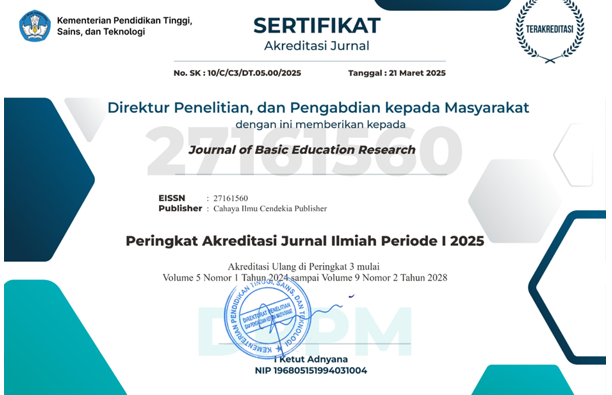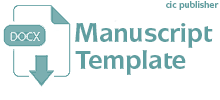Mastering Effective Sentences and Motivation on the Ability of Writing Narratives in Primary School
Abstract
Purpose of the study: The overarching objective of this research is to investigate the correlation of mastery of effective sentences and learning motivation on the ability to write narratives among fifth-grade elementary school students.
Methodology: The research is quantitative correlational. The study population consists of 168 class V students from Gugus Adiwiyata State Elementary School. Simple Random Sampling was used to select a sample of 100 students. Data collection methods include interviews, tests, document analysis, and questionnaires. Research instruments include interview guidelines, test instruments, assessment guidelines, and questionnaires. Prerequisite tests were conducted. Hypothesis testing techniques involve simple and multiple linear regression, t-tests, F-tests, and determinant coefficients.
Main Findings: The study, conducted at the high school level with a population of 47 students, reveals that learning motivation significantly influences student learning outcomes. Higher learning motivation correlates with better learning achievement compared to students with low motivation.
Novelty/Originality of this study: The mastery of effective sentences and learning motivation) demonstrate an influence on the ability to write narratives. Specifically, Mastery of effective sentences contributes 21.3% to students’ narrative writing ability. Learning motivation contributes 10.3% to the same ability. Together, these factors significantly impact narrative writing (Fcount > Ftable, 45.147 > 3.05), with an overall influence contribution of 38.7%. The remaining 31.3% is influenced by other factors. Based on these findings, teachers should focus on enhancing both sentence mastery and student motivation to improve narrative writing skills.
References
O. Hamalik, Teaching and Learning Process. Jakarta: Bumi Literacy, 2015.
A. Munib, Introduction to Educational Science. Semarang: Unnes MKU-MKDK Development Center, 2012.
A. Susanto, Learning and Learning Theory in Elementary Schools. Jakarta: Prenada Media, 2015.
D. Fitriyani, “Effective Sentence Mastery and Diction Mastery with Expository Writing Ability in Middle School Students,” Pesona Journal, Vol 1 No 2, 2015.
H. C. Yen, L. Heng, and S. S. Tseng, “Exploring the impact of video making on students’ writing skills,” Journal of Research on Technology in Education, vol. 53, no. 4, 2021, doi: 10.1080/15391523.2020.1795955
F. Tanrıkulu, “Students’ perceptions about the effects of collaborative digital storytelling on writing skills,” Computer Assisted Language Learning, vol. 35, no. 5-6, pp. 1090-1105, 2022, doi: 10.1080/09588221.2020.1774611
D. Samur, M. Tops, R. Slapšinskaitė, and S. I. Koole, “Getting lost in a story: How narrative engagement emerges from narrative perspective and individual differences in alexithymia,” Cognition and emotion, vol. 35, no. 3, pp. 576-588, 2021, doi: 10.1080/02699931.2020.1732876.
G. Kahveci and A. Guneyi, “The effect of personal narrative intervention on late talkers’ personal narrative generation skills,” Cogent Education, vol. 7, no. 1, 2020, doi: 10.1080/2331186X.2020.1758288
E. Syarif, Learning to Write. Jakarta: Department of National Education, 2009.
S. Yu, L. Jiang, C. Liu, and N. Zhou, “Profiles of Chinese secondary students’ L2 writing motivation and engagement,” Educational Psychology, vol. 42, no.8, pp. 972-990, 2022, doi: 10.1080/01443410.2022.2108765.
W. Chen, and W. Ren, “Educating L2 learners about collaborative writing: exploring the relationship between knowledge of collaborative writing and writing products,” Language awareness, vol. 31, no. 3, pp. 371-391, 2022, doi: 10.1080/09658416.2021.1969403.
P. M Rogers, J. M. Marine, S. T. Ives, S. A. Parsons, A. Horton, and C. Young, “Validity evidence for a formative writing engagement assessment in elementary grades,” Assessment in Education: Principles, Policy & Practice, vol. 29, no. 2, 2022, doi: 10.1080/0969594X.2022.2054942.
Y. Hu, and J. Choi, “Is creative teaching behaviours’ effect on English creative writing multi-mediated by writing and creative self-efficacy?,” New Writing, vol. 20, no. 4, pp. 383-399, 2023, doi: 10.1080/14790726.2023.2188223.
I. B. Hsin, and C. E. Snow, “Arguing for Teachers and for Friends: Eighth-graders’ Sensitivity to Argumentation Features When Judging and Revising Persuasive Essays,” Discourse Processes, vol. 57, no. 10, pp. 823-843, 2020, doi: 10.1080/0163853X.2020.1803032.
J. Lamoneda, S. González-Víllora, C. Evangelio, and J. Fernandez-Rio, “Hybridizing Outdoor Adventure Education and Cooperative Learning in physical education. Students and teachers’ views,” Journal of Adventure Education and Outdoor Learning, pp. 1-16, 2022, doi: 10.1080/14729679.2022.2087194.
F. M. Leo, A. Mouratidis, J. J. Pulido, M. A. López-Gajardo, and D. Sánchez-Oliva, “Perceived teachers’ behavior and students’ engagement in physical education: The mediating role of basic psychological needs and self-determined motivation,” Physical Education and Sport Pedagogy, vol. 27, no. 1, pp. 59-76, 2022, doi: 10.1080/17408989.2020.1850667.
T. Kumar, V. Nukapangu, and A. Hassan, “Effectiveness of code-switching in language classroom in India at primary level: a case of L2 teachers’ perspectives,” Pegem Journal of Education and Instruction, vol. 11, no. 4, pp. 379-385, 2021, doi: 10.47750/pegegog.11.04.37.
U. Khair, and M. Misnawati, “Indonesian language teaching in elementary school: Cooperative learning model explicit type instructions chronological technique of events on narrative writing skills from interview texts,” Linguistics and Culture Review, vol. 6, no. 2, pp. 172-184, 2022, doi: 10.21744/lingcure.v6nS2.1974.
D. Bailey, and A. R. Lee, “An exploratory study of Grammarly in the language learning context: An analysis of test-based, textbook-based and Facebook corpora,” TESOL International Journal, vol. 15, no. 2, pp. 4-27, 2020.
J. Wilby, “Motivation, self-regulation, and writing achievement on a university foundation programme: A programme evaluation study,” Language Teaching Research, vol. 26, no. 5, pp. 1010-1033, 2022, doi: 10.1177/1362168820917323.
G. Ling, N. Elliot, J. C. Burstein, D. F. McCaffrey, C. A. MacArthur, and S. Holtzman, “Writing motivation: A validation study of self-judgment and performance,” Assessing Writing, 48, 100509, 2021, doi: 10.1016/j.asw.2020.100509.
W. M. Seyoum, A. Yigzaw, and H. K. Bewuketu, “Students’attitudes and problems on question-based argumentative essay writing instruction,” Journal of English Language Teaching and Learning, vol. 3, no. 2, pp. 58-63, 2022, doi: 10.33365/jeltl.v3i2.2106.
L. S. Teng, and L. J. Zhang, “Empowering learners in the second/foreign language classroom: Can self-regulated learning strategies-based writing instruction make a difference?,” Journal of Second Language Writing, vol. 48, pp. 100701, 2020, doi: 10.1016/j.jslw.2019.100701.
Z. Zhang, “Learner engagement and language learning: a narrative inquiry of a successful language learner,” The Language Learning Journal, vol. 50, no. 3, pp. 378-392, 2022, doi: 10.1080/09571736.2020.1786712.
C. D. Robinson, “A framework for motivating teacher-student relationships,” Educational Psychology Review, vol. 34, no. 4, pp. 2061-2094, 2022, doi: 10.1007/s10648-022-09706-0.
S. Bulqiyah, M. Mahbub, and D. A. Nugraheni, “Investigating Writing Difficulties in Essay Writing: Tertiary Students' Perspectives,” English Language Teaching Educational Journal, vol. 4, no. 1, pp. 61-73, 2021, doi: 10.12928/eltej.v4i1.2371.
C. D. Zepeda, R. S. Martin, and A. C. Butler, “Motivational strategies to engage learners in desirable difficulties,” Journal of Applied Research in Memory and Cognition, vol. 9, no. 4, pp. 468-474, 2020, doi: 10.1016/j.jarmac.2020.08.007.
K. L. Wright, T. S. Hodges, S. Dismuke, and P. Boedeker, “Writing motivation and middle school: An examination of changes in students’ motivation for writing,” Literacy Research and Instruction, vol. 59, no. 2, pp. 148-168, 2020, doi: 10.1080/19388071.2020.1720048.
I. Suastra, and S. Menggo, “Empowering Students' Writing Skill through Performance Assessment,” International Journal of Language Education, vol. 4, no. 3, pp. 432-441, 2020, doi: 10.26858/ijole.v4i3.15060.
M. Y. Arindra, and P. Ardi, “The correlation between students’ writing anxiety and the use of writing assessment rubrics,” LEARN Journal: Language Education and Acquisition Research Network, vol. 13, no. 1, pp. 76-93, 2020.
T. H. Nguyen, W. Y. Hwang, X. L. Pham, and T. Pham, “Self-experienced storytelling in an authentic context to facilitate EFL writing,” Computer Assisted Language Learning, vol. 35, no. 4, pp. 666-695, 2022, doi: 10.1080/09588221.2020.1744665
A. Nunes, C Cordeiro, T. Limpo, and S. L. Castro, “Effectiveness of automated writing evaluation systems in school settings: A systematic review of studies from 2000 to 2020,” Journal of Computer Assisted Learning, vol. 38, no. 2, pp. 599-620, 2022, doi: 10.1111/jcal.12635.
Copyright (c) 2024 Sugini Sugini, Tifani Hermawan, Somayeh Barzegar, Polyvios Androutsos

This work is licensed under a Creative Commons Attribution-NonCommercial 4.0 International License.
Authors who publish with this journal agree to the following terms:
- Authors retain copyright and acknowledge that the Journal of Basic Education Research is the first publisher licensed under a Creative Commons Attribution 4.0 International License.
- Authors are able to enter into separate, additional contractual arrangements for the non-exclusive distribution of the journal's published version of the work (e.g., post it to an institutional repository or publish it in a book), with an acknowledgment of its initial publication in this journal.
- Authors are permitted and encouraged to post their work online (e.g., in institutional repositories or on their website) prior to and during the submission process, as it can lead to productive exchanges and earlier and greater citation of published work.





.png)


.png)
.png)


















